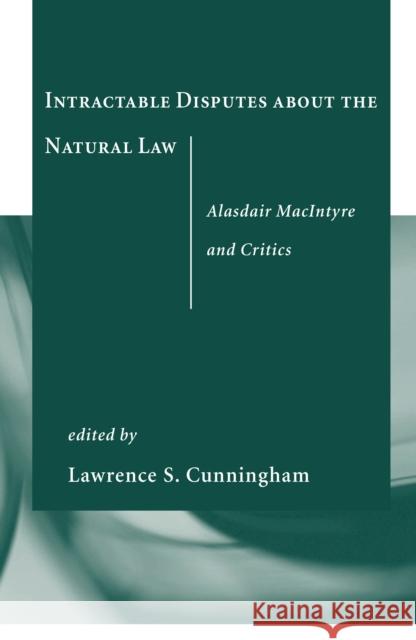Intractable Disputes about the Natural Law: Alasdair MacIntyre and Critics » książka
Intractable Disputes about the Natural Law: Alasdair MacIntyre and Critics
ISBN-13: 9780268023003 / Angielski / Miękka / 2009 / 388 str.
Both as cardinal and as Pope Benedict XVI, one of Josef Ratzinger's consistent concerns has been the foundational moral imperatives of the natural law. In 2004, then Cardinal Ratzinger requested that the University of Notre Dame study the complex issues embedded in discussions about "natural rights" and "natural law" in the context of Catholic thinking. To that end, Alasdair MacIntyre provided a substantive essay on the foundational problem of moral disagreements concerning natural law, and eight scholars were invited to respond to MacIntyre's essay, either by addressing his work directly or by amplifying his argument along other yet similar paths. The contributors to this volume are theologians, philosophers, civil and canon lawyers, and political scientists, who reflect on these issues from different disciplinary perspectives. Once the contributors' essays were completed, MacIntyre responded with a closing essay.Throughout the book, the contributors ask: Can a persuasive case for a foundational morality be made etsi Deus daretur (as if God did not exist)? And, of course, persuasive to whom? The exchanges that take place between MacIntyre and his interlocutors result, not in answers, but in rigorous attempts at clarification. Intractable Disputes about the Natural Law will interest ethicists, moral theologians, and students and scholars of moral philosophy."Lawrence Cunningham has assembled an esteemed group of scholars to provide incisive analyses of the contemporary state of natural law theory, particularly in light of Alasdair MacIntyre's groundbreaking work. The essays are lucid, engaging, and intellectually sophisticated. Intractable Disputes about the Natural Lawis a must-read not only for moral theologians, but for anyone concerned about the conceptual foundations of human rights, human dignity, and moral dialogue in pluralistic societies." --Stephen J. Pope, Boston College"MacIntyre's first essay, on its own, would make this book an important scholarly contribution. But the ensuing contributions enable the book to flourish further, with contributions on subjects both readily associated with natural law and moral disagreement (for example, common morality, human rights, and rival visions of virtue) as well as those more creatively connected to the genesis of the text (sacramental life, interreligious dialogue, and modes of moral discourse). Cunningham's volume both broadens and deepens contemporary thinking on a perennial topic, and will richly reward its readers." --William C. Mattison III, The Catholic University of America











